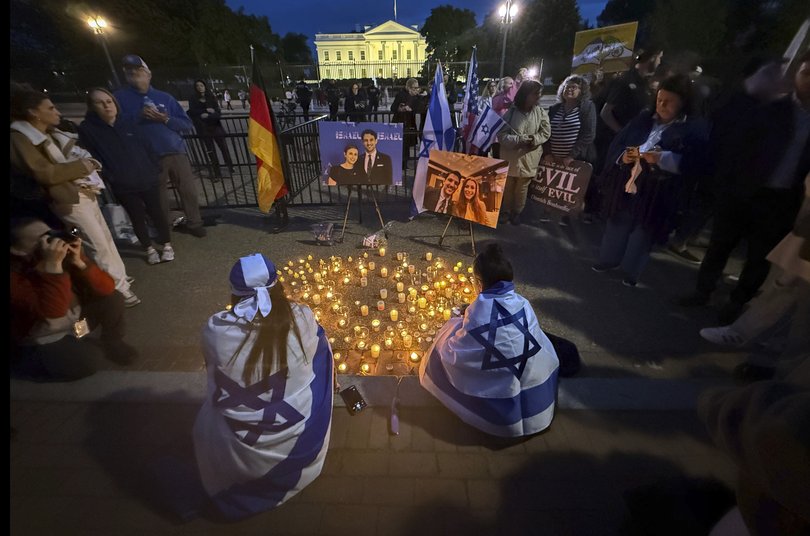THE WASHINGTON POST: Israeli embassy attack the latest chapter in harrowing anti-Semitism reality
MARK LASSWELL: The ghastly murder in Washington of two employees of the Israeli Embassy outside a Jewish museum is the latest harrowing chapter in the grim rise of anti-Semitism.

The ghastly murder in Washington of two employees of the Israeli Embassy outside a Jewish museum — by a shooter who, according to police, afterward proclaimed “free, free Palestine” — was a horrifying eruption of the world’s longest-running hatred. It occurred during a period when the line between anti-Zionism and anti-Semitism, which was once at least paid lip service in the West’s public squares, has become increasingly difficult to discern.
Even without this devastating news, the past week would have been notable in the tide of global anti-Semitism that, confoundingly, flowed from Hamas’s October 7, 2023, terrorist attack on Israel. Or at least the week was remarkable in its particulars; something similar could be written, changing only the details, almost anywhere you look on the calendar.
Last Monday saw the resignation of Gary Lineker, the BBC’s highest-paid employee, whose celebrity in Britain as a genial retired athlete, sports commentator and product endorser makes Shaquille O’Neal look like an American homebody. As often happens with those who mistake their talent — in acting, music or, as with Lineker, putting a soccer ball into the net — for wisdom regarding Middle Eastern affairs, Lineker is a fervent advocate for the Palestinian cause. And as sometimes happens with Palestinians’ overseas allies, Lineker had a let-the-mask-slip moment, sharing an Instagram story called “Zionism explained in two minutes,” illustrated with an image of a rat.
Sign up to The Nightly's newsletters.
Get the first look at the digital newspaper, curated daily stories and breaking headlines delivered to your inbox.
By continuing you agree to our Terms and Privacy Policy.Given that the use of a rat in connection with Jews is anti-Semitism explained in about one second, this apparently was too much even for the BBC. (The government-backed broadcaster is contending with the fallout of having aired a documentary about Gaza with a child narrator whose father, it turned out, was a Hamas official. The BBC withdrew the documentary, a move that Lineker criticised.) The Match of the Day host apologised for the rodent incident and pleaded ignorance about the connotations of an image beloved by nazi propagandists, but his decades-long career at the BBC was over. He’ll be fine: Lineker operates a flourishing podcasting company with offerings that include, ironically, the audio juggernaut The Rest Is History.
That was Monday. On Tuesday, a United Nations humanitarian official informed a horrified world that “14,000 babies” in Gaza “will die in the next 48 hours” if Israel failed to facilitate enough aid deliveries to save them. Medieval blood-libellers would have been awestruck by the speed with which this preposterous assertion circled the globe. Accusing Jews of murdering non-Jewish babies is perhaps the most grotesque implement in the anti-Semite’s toolbox, but, of course, the UN official’s heart is unknowable, so make of it what you will. The BBC, where his pronouncement aired on the Today radio program, later passed along a clarification gleaned from the source used by the UN: About 14,000 cases of “severe acute malnutrition” among Gazan children aged six months to “59 months” are possible by March 2026 if more aid is not delivered.

On Wednesday came the nightmare news about the murders of Yaron Lischinsky and Sarah Lynn Milgrim in Washington. In a world that was even mildly just, the death of this young couple would give pause to globalise-the-intifada casual anti-Semites everywhere.
As it happens, anti-Semitism is the theme of a powerful, thoroughly disquieting and timely play now onstage in London. John Lithgow stars in Mark Rosenblatt’s Giant as the children’s author Roald Dahl, secure in his fame and marinating, as is gradually revealed, in his detestation of Jews. The play is set in 1983 during a real-life career crisis for Dahl: He has written a book review that veered from assailing Israel into airing rancid views about Jews generally, and his publisher is alarmed by the potential impact on sales of his new book, The Witches.
On Monday night at the Harold Pinter Theatre, Lithgow was extraordinary as the prickly but tenderhearted host for the nervous publisher’s reps trying to persuade him to issue an apology. He gets all the laughs and has the best lines … until he has the worst ones, too. The audience is seduced by his wit and bravado, and maybe some even buy into his denunciation of Israel’s 1982 invasion of Lebanon, but, then, well, there were a few audible groans in the audience when he unburdens himself of what he really thinks about the Jews.
As long as we’re on this theme, it will be notable for some, in a good way, that the English soccer team Tottenham Hotspur on Wednesday night won the Europa League championship. Spurs, as they’re called, have long been known as a “Jewish” team, ostensibly because long ago the Tottenham area of London had a large concentration of Jewish residents. In the often vicious rivalries of English soccer, Spurs’ Jewish identity became a target — opposing fans as recently as two years ago have been known to make hissing sounds to suggest a gas chamber when Tottenham comes to play.

Poison knows no borders, of course; in 2012 in Rome and in 2013 in Lyon, Spurs supporters travelling to watch matches were the subject of thuggish anti-Semitic attacks. The episodes were disturbing but also slightly bizarre: the Spurs fan base today isn’t notably more Jewish than other teams’. In response to the long-standing abuse from rivals, though, many of the club’s supporters embrace the identity, calling themselves the “Yid army”.
That said, one Spurs fan lately has gained prominence indisputably because she is Jewish: British-Israeli Emily Damari, who was kidnapped by Hamas terrorists in their October 7 rampage and held hostage for 471 days. She was released in January, and earlier this month the 28-year-old Damari attended a Spurs home match, greeted by hundreds of Tottenham supporters outside the stadium. Now the team has won its first trophy in 17 years, its first European cup in 41 years. It’s nice, amid so much demoralising news about antisemitism, to know Damari has something to cheer about.
